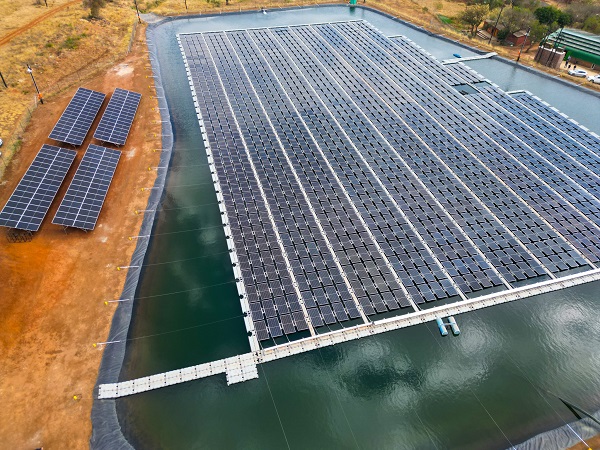Although loadshedding and significant power outages have not been a feature of South African life for a while, rapidly increasing electricity tariffs that far outstrip inflation and worries about future energy security are still causing sleepless nights for farmers.
However, for a family-owned farm, about three kilometres from Malelane, the future is clearer, thanks to their decision to keep production on track and reduce escalating energy costs, a move that has resulted in a sizable solar-powered solution.
What makes the solar plant at Radley Landgoed unique is that 80% of the solar panels – a massive 3 350 square metres – are located on the surface of one of the estate’s largest irrigation dams.
This makes the project Mpumalanga province’s most significant agricultural power project and the only ‘water-borne’ plant in the region and possibly in South Africa.
Recently switched on, power reaches vital parts of the farming operation through a seven-kilometre network of custom-built pylons.
“The project, financed in partnership with Standard Bank’s Business and Commercial Banking (BCB) division, which was completed in a year, can produce up to 1.8GWh of power and can take the estate, including the farm homesteads, support buildings and staff quarters, entirely off-grid when necessary,” says Yaseen Guman, Standard Bank’s Head of Business Banking Client Coverage, Mpumalanga.
“Conservative estimates show that the project costs will be amortised in about 10 years, and the installation will have a lifespan of about 30 years. Savings began accruing the day the plant went operational, and will increase over time as energy costs increase annually.
Perhaps more important to our clients is the fact that production losses and the costs of fuelling generators, which increased operating costs by a substantial amount each year, are now a thing of the past.”
Mr Renald Radley, who, with his brothers Wilscott and Henno, is managing the farm, which has been in the family for about 80 years, says that loadshedding was the primary reason they decided to go solar with the estate’s 1 900 hectares of land.
Farming operations, including 157 hectares of citrus orchards, 536 hectares of high sucrose-producing sugar cane, 34 hectares of mango orchards, and a Nguni cattle stud of 105 breeding cows, have been secured.
“Loadshedding was a significant obstacle that created uncertainty and disrupted our daily farming activities. Traditional power sources and outages impacted our ability to irrigate crops, power essential equipment and maintain productivity.”
“Going solar with the support of Standard Bank has meant that this uncertainty and the losses that occurred when infrastructure had to be repaired and power was lost for days at a time and resetting, and potential damage to automated systems have also faded into the background.”
The location of solar panels on the irrigation dam offers several advantages – no potentially productive land has had to be set aside for the solar array, and clean energy is generated while irrigation capacity is maintained at optimum levels.
Other benefits include easy maintenance and the fact that the dam water provides cooling for the panels, and that workers conducting panel cleaning and repair operations have easy access through a series of walkways between rows of panels.
“Arranging the finance for a ‘water-borne’ solar plant was a first for Standard Bank’s BCB division and reflected our commitment to providing finance for sustainable solutions that encourage the acquisition of renewable-energy projects.
The Radley Landgoed project joined our recent involvement in a farm-based private hydro-electric plant in the Eastern Cape in the ‘firsts’ column of BCB’s growing book on the development of renewable-energy projects,” says Guman.
Besides the direct advantages that the solar power installation brings to the farm, additional marketing benefits can accrue. Much of the produce grown on the farm is packed at the nearby Malelane Citrus Cooperative, where it is packed for export.
“Because much of Radley Landgoed’s output could benefit from the carbon credits offered by the EU for produce grown with green energy, better prices and increased sales volumes could be achieved. This is good news for a community that relies on agriculture for much of its income and employment,” says Guman.
In conclusion he says, “The Radley Landgoed project, like many others undertaken in the agricultural sector, reflects our approach of investing in partnerships that are key to growth, are financially inclusive, support supply chain efficiency and minimise food wastage by addressing deficiencies in the energy grid.”
Also Read
Major deal signed to bolster Tanzania’s Mkulazi agriculture investment city
CLAAS and AgXeed are exploring areas of application for autonomy in forage harvesting
